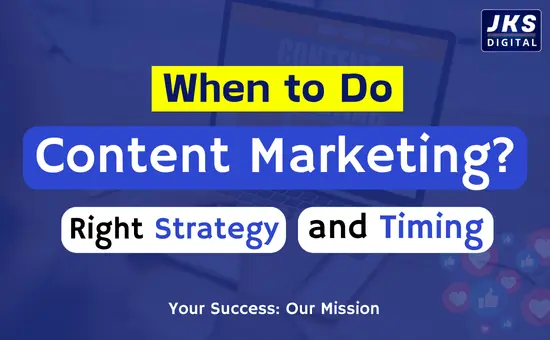When to Do Content Marketing: Content marketing is one of the most effective tools in a marketer’s arsenal, but its success largely depends on timing and strategy. Knowing when to leverage content marketing can significantly impact your brand’s growth, audience engagement, and return on investment. In this article, we’ll explore the best times to implement content marketing and how to craft strategies that resonate with your audience.

Understanding Content Marketing and Its Importance
Content marketing focuses on creating and sharing valuable, relevant, and consistent content to attract and retain a clearly defined audience. Unlike traditional advertising, it is not about selling directly but building trust, educating customers, and nurturing long-term relationships.
Why Timing Matters
Timing can determine whether your audience engages with your content or ignores it. For example:
- A holiday campaign is effective before the holiday season, not during or after.
- An informative blog about tax-saving tips performs better in the tax season than mid-year.
The right timing ensures your content is both relevant and impactful.
When Should You Use Content Marketing?
1. During Business Launch or Rebranding
If you are launching a new product, service, or brand, content marketing can:
- Build awareness about your business.
- Educate potential customers about your offerings.
- Generate excitement and interest.
For example, publishing a blog about how your product solves a common problem can help people understand its value right from the start.
Read also – Facebook Ads Strategies: Drive Engagement and Boost Conversions
2. When You Notice Audience Engagement is Low
If your social media engagement or website traffic is stagnant, it’s time to analyze your audience’s needs and create tailored content:
- Publish how-to guides, FAQs, or case studies that address their challenges.
- Use engaging formats like videos, infographics, or interactive quizzes to rekindle interest.
3. Seasonal Opportunities
Seasonal content marketing aligns with specific times of the year, like holidays, festivals, or industry-specific trends. For example:
- E-commerce: Focus on gift guides during Christmas or Diwali.
- Education: Publish admission-related tips during admission cycles.
Seasonal content is highly relevant and can boost your visibility during peak times.
4. When Entering a New Market
If you’re expanding your business into a new demographic or region, use content marketing to:
- Understand your new audience’s preferences through research.
- Create culturally relevant and localized content that resonates.
For example, if you’re targeting a younger audience, short-form videos or memes might be more effective than long blogs.
Read also – 10 Proven Backlink Strategies to Elevate Your SEO Game
5. To Support Sales Campaigns
Content marketing can complement your sales efforts by:
- Generating leads through high-value offers like eBooks or free webinars.
- Providing educational content that guides customers through the sales funnel.
- Using testimonials or case studies to build credibility.
6. When Building Authority in Your Industry
If you aim to establish your business as a thought leader, consistent content marketing is crucial.
- Publish blogs, whitepapers, or research reports showcasing your expertise.
- Host podcasts or webinars to connect with your audience directly.
Strategies for Effective Content Marketing
1. Understand Your Audience
Knowing your audience is the foundation of content marketing. Use analytics tools and surveys to learn:
- Their pain points and challenges.
- Preferred content formats (e.g., blogs, videos, or infographics).
- Platforms they frequent (e.g., LinkedIn, Instagram, or YouTube).
Read also – Scope of Digital Marketing: Will It Increase or Decrease in 2025?
2. Plan Around a Content Calendar
A content calendar ensures you publish the right content at the right time.
- Schedule posts around major events, holidays, and industry trends.
- Use tools like Google Trends to identify hot topics.
- Ensure a mix of evergreen and timely content for consistency.
3. Optimize for SEO
Search Engine Optimization (SEO) is vital for organic reach.
- Use keywords your audience is searching for.
- Include meta tags, alt text, and high-quality backlinks.
- Regularly update old content to keep it relevant.
4. Leverage Analytics
Track your content’s performance to identify what works and what doesn’t. Tools like Google Analytics or social media insights can help you refine your strategy for better results.
5. Be Consistent
While timing is essential, consistency is equally important.
- Publish content regularly to keep your audience engaged.
- Create a balance between promotional and value-driven content.
Read also – Developing a Content Marketing Strategy: A Complete Guide
Conclusion
Content marketing is a powerful way to connect with your audience, build trust, and achieve your business goals. However, success depends on knowing when to act and crafting the right strategy.
By aligning your content with audience needs, seasonal opportunities, and your business objectives, you can maximize the impact of your efforts. Remember, timing isn’t everything—it’s also about delivering value at the right moment.

